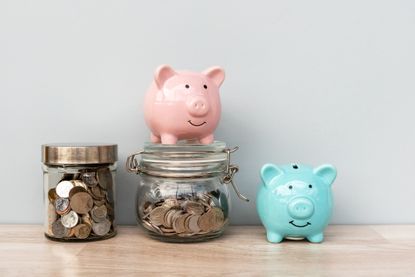How To Invest Your Tax Return
When thinking about how to invest your tax return, prioritize your financial health over aggressive – and risky – ideas like bitcoin.


Tax Day is quickly approaching and more than a few folks are likely scrambling to finish filing their paperwork. And you're one of the many getting money back this year, you may be wondering how to invest your tax return.
According to March data from the Internal Revenue Service (IRS), the average refund for 2024 is up moderately over 2023 numbers, to nearly $3,200.
That's a significant chunk of change – and since that figure is just an average, there will be some Americans who may be getting checks for more than that amount in the coming weeks.

Sign up for Kiplinger’s Free E-Newsletters
Profit and prosper with the best of expert advice on investing, taxes, retirement, personal finance and more - straight to your e-mail.
Profit and prosper with the best of expert advice - straight to your e-mail.
For many households, tax refunds are a much-needed influx of cash to help defray necessary expenses. For others, it's a one-time windfall that may quickly be reallocated to summer vacations – or for the more aggressive folks, investments in volatile assets such as cheap stocks or cryptocurrency.
But if you're thinking about the long haul, you may want to consider investing your tax return in a structural way. Here, we take a look at how to invest your tax return doing just that.
How to invest your tax return: Fund a rainy-day account
Studies have shown that roughly half of Americans have $500 or less in emergency savings. If this sounds familiar, then your first investment should be to protect yourself.
The needs of each family are different and for some, even a few thousand dollars is just a drop in the bucket to cover their expenses. According to the Census Bureau, the median household income in the U.S. is just under $75,000. This means that a family living paycheck to paycheck would need about $6,000 to cover a month's worth of expenses.
Building a financial safety net is crucial if you don't currently have one. Beyond the peace of mind it provides, this low-risk investment in your savings can quickly pay for itself when you consider the high costs of overdraft fees, a poor credit score and other factors.
How to invest your tax return: Pay off high-interest debt
Another structural financial problem for many Americans is high-interest debt, with the average credit card interest rate hovering around 22% right now, according to WalletHub.
Research shows the stock market generally returns about 10% each year on average, so you'll get more than twice the bang for your buck by simply paying down debt and reducing your monthly payments.
If you're skeptical of that, then consider this math: If you have that 22% interest rate on a $2,000 purchase but can only afford to pay $50 a month on your balance, you'll ultimately end up paying more than $4,000 in full for that item.
Rather than pay double the original purchase price, you can save yourself significant interest payments by paying down the principal value as quickly as possible. Even if your total balance is larger than your return, beating back your debt as much as you can is still a wise investment.
How to invest your tax return: Open a Roth IRA
If you're more patient, investing your tax return in a Roth IRA may make more sense. You invest after-tax money in these platforms and then can withdraw it free and clear after the age of 59 ½.
That may sound like a long time, but you'll need the money come retirement – and gains over the intervening years may ultimately turn your 2024 tax return into a very big chunk of change when it comes time to cash out.
How to invest your tax return: Seek out a financial or tax adviser
Speaking of interest, here's a reality check: Receiving a big tax refund is not necessarily a good thing, since the IRS does not pay you a penny of interest. You're effectively giving Uncle Sam a free loan across the year.
If you get a particularly large return, then, it may make sense to invest that cash in a professional who can help optimize your tax status going forward and set you up for future success.
Most tax advisers are happy to work for a fee-only model, where they charge you a flat or hourly rate. Even if you don't want to pay for ongoing tax preparation every year, they can generally counsel you on how to optimize your deductions and withholding in the future to keep more of each paycheck in your pocket.
Similarly, fee-only financial advisers accept one-time charges in exchange for advice that will set you up for success. Many understand tax efficiency and can also help assess your general financial planning needs for the long term.
How to invest your tax return: Buy an index fund
It's great news if you're lucky enough to have savings, no debt and a generally sound retirement plan. That means you have the flexibility to invest your tax return and put it to work in index funds.
These products are pooled investments that are incredibly affordable, including the popular iShares Core S&P 500 ETF (IVV) that commands nearly $450 billion in assets and holds the 500 largest U.S. stocks including Microsoft (MSFT) and Apple (AAPL). The exchange-traded fund charges investors a mere 0.03% in annual expenses, which on a $3,000 tax return adds up to just 90 cents per year!
If you want to grow the money quickly, you can purchase these products in a taxable brokerage account. As you may have guessed, however, you'll have to pay taxes on the profits down the road.

Jeff Reeves writes about equity markets and exchange-traded funds for Kiplinger. A veteran journalist with extensive capital markets experience, Jeff has written about Wall Street and investing since 2008. His work has appeared in numerous respected finance outlets, including CNBC, the Fox Business Network, the Wall Street Journal digital network, USA Today and CNN Money.
-
 Is 100 the New 70?
Is 100 the New 70?Eating well, exercising, getting plenty of sleep and managing chronic stress can help make you a SuperAger. Funding that long life requires longevity literacy.
By Phil Wright, Certified Fund Specialist Published
-
 Nine Lessons to Be Learned From the Hilton Family Trust Contest
Nine Lessons to Be Learned From the Hilton Family Trust ContestDisclaimers, good communication, post-marital agreements and more could help avoid conflict in a family after the owners of a wealthy estate pass away.
By John M. Goralka Published
-
 Stock Market Today: S&P 500, Nasdaq Extend Losing Streaks
Stock Market Today: S&P 500, Nasdaq Extend Losing StreaksThe two indexes have closed lower for five straight sessions.
By Karee Venema Published
-
 Buy eBay and Sell Etsy, Morgan Stanley Says
Buy eBay and Sell Etsy, Morgan Stanley SaysMorgan Stanley is bullish on eBay and bearish on Etsy. Here’s what you need to know.
By Joey Solitro Published
-
 Why Taiwan Semiconductor Stock Is Falling After Earnings
Why Taiwan Semiconductor Stock Is Falling After EarningsTaiwan Semiconductor beat expectations for the first quarter but its stock is notably lower. Here's why.
By Joey Solitro Published
-
 Starbucks BOGO and New Sweet and Spicy Drinks
Starbucks BOGO and New Sweet and Spicy DrinksFor a limited time, Starbucks is announcing four new "swicy" drinks that are both spicy and sweet.
By Kathryn Pomroy Published
-
 Stock Market Today: Dow Slips After Travelers' Earnings Miss
Stock Market Today: Dow Slips After Travelers' Earnings MissThe property and casualty insurer posted a bottom-line miss as catastrophe losses spiked.
By Karee Venema Published
-
 Why United Airlines Stock Is Flying Higher After Earnings
Why United Airlines Stock Is Flying Higher After EarningsUnited Airlines beat expectations for the first quarter and its stock is by soaring. Here's what you need to know.
By Joey Solitro Published
-
 Super Micro Computer: Why This Hot Stock Could Hit $1,500
Super Micro Computer: Why This Hot Stock Could Hit $1,500Super Micro Computer's long-term AI revenue potential is underappreciated, Loop Capital says. Here's what you need to know.
By Joey Solitro Published
-
 Stock Market Today: Stocks Stabilize After Powell's Rate-Cut Warning
Stock Market Today: Stocks Stabilize After Powell's Rate-Cut WarningThe main indexes temporarily tumbled after Fed Chair Powell said interest rates could stay higher for longer.
By Karee Venema Published